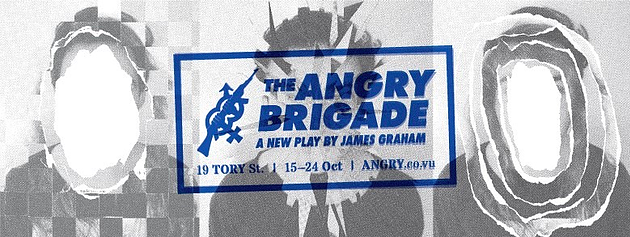Diesel McGrath
And what better way to settle our audience and deliver a mission objective than through humour (and much chin), courtesy of the thoroughly entertaining Andrew Patterson. His performance throughout involving a number of clear offerings for various characters, each with their own distinct and accomplished voice work/accents, a sentiment I’d extend to include the entire ensemble. So easily can an ineffective accent throw a performance, making you cringe with your head in your hands for the person trapped onstage. It's so satisfying when this isn’t the case, and when you’re dealing with multiple accents, such as with Patterson, it can make for an impressive technical display.
Accent appreciation aside, Karin McCracken as Parker has some really endearing moments, and I found myself in hysterics at one point at her reaction to a certain letter turning up. She also works well as Hillary to establish an unaddressed air of tension between characters later on in the narrative. Patrick Carroll is effervescent, fast-paced, yet precise in his delivery as Smith. Throughout the first half of the performance, he's the guy you're rooting for, and his commitment towards both spearheading the job at hand, and inspiring his fellow castmates, is key to the successful escalation of events in the early half of the narrative. This gradual escalation, wherein the cast of detectives explore their enemy ideology by subscribing to it, is a joy to behold, and climaxes with great hilarity, the details of which I won't spoil. Let’s just say it is rewarding to watch characters change so drastically, yet believably, given the nature of their circumstances.
The music is crude, though suitable in being so, and there's this feeling the cast are aware of this, playing, albeit a tad subtler than your average punk rocker, at making harsh, disruptive sounds wherever they can. I’d love to have seen what the grunt of an electric guitar could have added to the mix of it all. The lighting design, by Rowan McShane, served the piece well, neither calling attention to itself, nor being too limited in variation. There’s some fun torch play as well, and I mean really fun.
An interval divides the play into two halves, and this seems appropriate given the second begins with both a shift in perspective and tone, allowing for the audience to take a break, and the performers to reset the stage. I do have to wonder, however, whether the meticulous placement of props could have been minimalised for efficiency, especially considering their positioning becomes irrelevant so early into the second half. Were the cast and crew to restage this piece (and I hope they do), I would love to see how the whole set could turn to custard over the duration of the play, and how the second half could pick up the action in the midst of a bomb site.
At the heart of The Angry Brigade is a discussion of ideology, and I found most of its thought provocation came strongest towards its conclusion. This is no doubt due to Comfrey Sanders, an actress who seems at ease onstage, and whose emotional breadth allows the audience to engage with an effortless sympathy towards her predicament. As Anna, she steps outside of the chaos of those around her, and this distancing allows us to understand why someone would want for a normal life; to be content with just that. It was during those final moments of the performance where I found myself reflecting upon the play’s deeper themes.
Under Samuel Phillips’ capable direction, The Angry Brigade has been realised as a valuable and insightful piece of theatre, and is worthy of both viewing and subsequent pondering over. Though the text’s events have long passed, its content remains ultimately relevant. There is so much in the world to get angry about, and so much routine and condition of living to question. The strength of its ensemble help with the exploration of an alternative school of thought, weighing it against the everyman, while simultaneously refusing to shove it down your throat, providing you with just enough to reach your own self-drawn conclusions.






